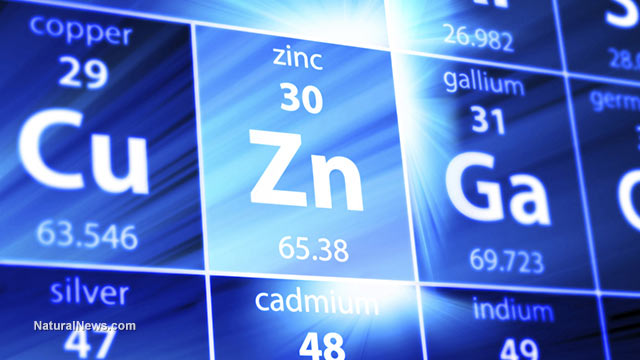ZINC found to be a powerful mineral “secret” for fighting viral infections of the liver (such as hepatitis C)
06/07/2017 / By Tim Wesley

Researchers were surprised to discover that zinc may have the potential to fight liver disease by suppressing the inflammatory effects of a protein called interferon lambda 3 (IFN-?3). This new research, published in Nature Communications, proved how beneficial the mineral is in curbing the negative effects of liver disease.
Led by Dr. Scott Read and Associate Professor Golo Ahlenstiel, the study was a collaboration between the Storr Liver Centre at Westmead Institute and the Centre for Virus Research and Kirby Institute. It offered proof that zinc is a powerful and specific inhibitor for IFN-?3 when it comes to viral infections like influenza and hepatitis C. IFN-?3 is a protein that is directly related to tissue damage in chronic liver disease. It also reduces antiviral activity and increases viral replication both in-vitro and in-vivo.
“We have demonstrated that zinc inhibits numerous facets of the liver’s immune response to viruses that may be mediated by IFN-?3,” said Dr. Read. He also added that zinc blocks the inflammatory activity of IFN-?3, which is strongly associated with the advanced progression of cirrhosis both in viral and non-viral liver disease.
“Our data suggests that serum zinc levels in patients with chronic hepatitis C are genetically predetermined by the IFN-?3 polymorphism, confirming the inhibitory role of zinc in vivo. The data highlights the potential for zinc to be used as a simple and effective treatment against acute and chronic inflammation in the liver,” Dr. Read stated.
According to the Liver Center of Saint Louis University, liver disease, which includes hepatitis, cancer, and cirrhosis, is the 12th leading cause of death in the U.S. There are more than 20 liver diseases currently diagnosed but although there are available treatments, these can only slow down the progression of the disease. The Center for Disease Control and Prevention said that an estimated 15,000 Americans die from liver cancer or chronic liver disease that’s associated with viral hepatitis.

The new study may provide patients with renewed hope for relief, since zinc is naturally found in a lot of the stuff we eat. It’s an essential trace mineral that plays a critical role in synthesizing protein and regulating cell production in the body’s immune system. It’s mostly concentrated in the strongest muscles of the body and is highly concentrated in areas like the skin, liver, eye retina, white and red blood cells, bones, and pancreas. It’s also found in semen and the prostate gland. Dr. Read’s findings provided a concrete evidence of zinc’s potential to become a simple yet effective treatment for acute and chronic liver inflammation.
The mineral is crucial for various body functions. More than 300 different enzymes need zinc to perform normally. Deficiency in zinc can result to loss of appetite, depression, loss of smell and taste senses, low blood pressure, growth retardation, fatigue, hair loss, weight loss, diarrhea, white spot formation under the finger nails, and rough/pale skin.
Zinc deficiency is also associated with liver cirrhosis. Various studies show that zinc supplementation helps improves neurological symptoms and malnutrition associated with liver diseases. It’s also believed to aid in staving off acute and chronic liver diseases. It also helps manage alcoholic liver diseases by inhibiting the formation of free oxygen radicals and improving antioxidant pathways.
There are ways to prevent liver problems: avoid alcohol and drugs, use medication wisely, exercise, get vaccinated, and eat healthily. A healthy amount of zinc in your diet can aid in improving the immune system and encourage faster wound healing. You can get it from oysters, lobsters, crabs, poultry, meat, legumes,vegetables like mushrooms and broccoli, whole grains, milk and dairy.
Sources include:
Submit a correction >>
Tagged Under:
liver disease, zinc benefits
This article may contain statements that reflect the opinion of the author





















